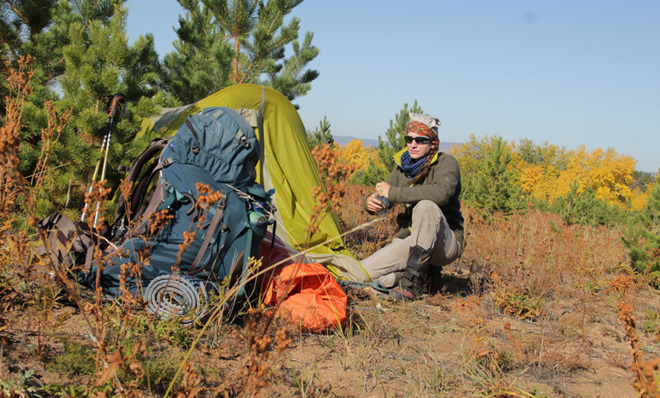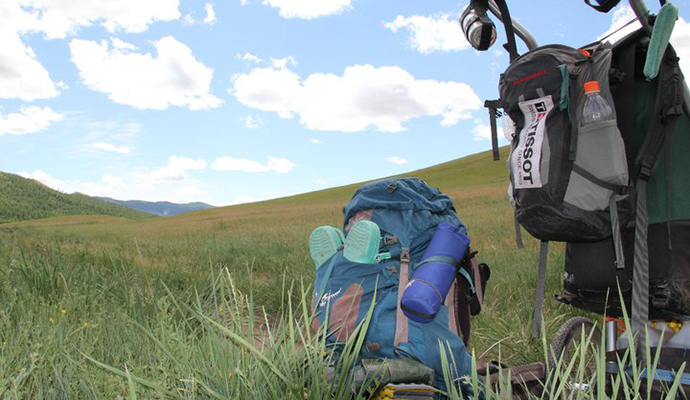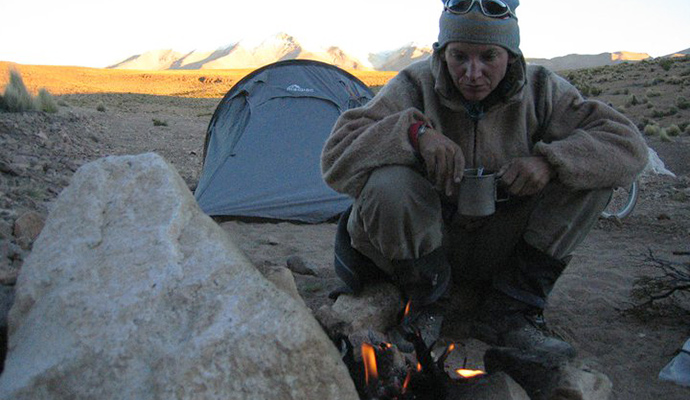The woman who walked 10,000 miles
For three years, Sarah Marquis trekked across Asia and Australia. It changed her forever.

A free daily email with the biggest news stories of the day – and the best features from TheWeek.com
You are now subscribed
Your newsletter sign-up was successful
A HUNDRED YEARS ago, when Robert Falcon Scott set out for Antarctica, his two primary goals were scientific discovery and reaching the geographic South Pole. Arguably, though, Scott was really chasing what contemporary observers call a sufferfest. He set himself up for trouble: Scott brought Manchurian and Siberian ponies that quickly fell through the snow and ice; he had his crew pull sleds full of gear, instead of relying on dogs. The expedition ended terribly; everybody who made the push to the pole died. Miserable, starving, and frostbitten, one of Scott's last four men killed himself by walking into a blizzard without even bothering to put on his boots.
In the taxonomy of travelers, the word "explorer" suggests a morally superior pioneer, a man or woman who braves the battle against nature to discover new terrain, expanding our species' understanding of the world. "Adventurer," by contrast, implies a self-indulgent adrenaline junkie who scares loved ones by courting puerile risk.
The former, obviously, is the far better title, but it's tough to claim these days. The world is Google-mapped. Reaching the actual virgin territory of space or the deep ocean requires resources that few possess.
The Week
Escape your echo chamber. Get the facts behind the news, plus analysis from multiple perspectives.

Sign up for The Week's Free Newsletters
From our morning news briefing to a weekly Good News Newsletter, get the best of The Week delivered directly to your inbox.
From our morning news briefing to a weekly Good News Newsletter, get the best of The Week delivered directly to your inbox.
But then there's Sarah Marquis, who perhaps should be seen as an explorer like Scott, born in the wrong age. She is 42 and Swiss and has spent three of the past four years walking about 10,000 miles by herself, from Siberia through the Gobi Desert, China, Laos, and Thailand, then taking a cargo boat to Brisbane, Australia, and walking across that continent. Along the way, like Scott, she has starved, she has frozen, she has (wo)man-hauled. She has pushed herself at great physical cost to places she wanted to love but ended up feeling, as Scott wrote of the South Pole in his journal: "Great God! This is an awful place."
MARQUIS GREW UP in Montsevelier, a village of 500 people in the Jura Mountains, in what Marquis describes as "the northern part of Switzerland — it's not the nice part." Her father, who worked as an engineer, paid Marquis one franc for every 100 slugs she picked out of the family garden. She befriended the family ewe, Moumou, and trained the pet rabbit to come when called. She liked people less. At age 8, she ran into the woods with her dog and spent the night in a cave. Marquis's mother called the police, but when Marquis returned, her mother didn't scold. Fighting Marquis' wanderlust was hopeless.
When she was 16, Marquis answered an ad for a train company that promised free travel. She loved the idea of seeing Paris and Milan, but her colleagues, almost all of whom were older men, harassed her relentlessly. The experience was a boot camp — punishing but character-strengthening. "I learned how to build myself," she said. "I built the tough skin I needed for later on."
Marquis' desire to travel began to coalesce around the question of whether she could survive by herself in nature. First, she decided to ride a horse across Turkey. On that trip, she ate apricots off trees and slept with her head on her saddle. Muslim women bathed her in warm goat's milk.
A free daily email with the biggest news stories of the day – and the best features from TheWeek.com
But after that, Marquis' itineraries veered away from romance and pleasure into solitude and suffering. In her early 20s, she flew to New Zealand and set out on a four-day backpacking trip with some noodles, a huge radio, and three or four books — "everything except what I needed." The outing, by typical standards, was a fiasco. Day One, it poured; Marquis didn't know how to set up her tent, and she was freezing and bored because, she now said wryly, "at night there was nothing to do." But near the end of the trip, she had a sort-of epiphany. "Something happened," she said. Chasing that inexplicable sensation is why she walks.

Marquis spent the winter after that trip earning money by bartending at a ski resort in the Alps. The next summer, she returned to New Zealand. This time, she walked into the South Island's Kahurangi National Park without food to see if she could survive for 30 days. That trip, too, was a trial. Marquis failed at spearfishing, consumed only mussels, and lost 20 pounds. But she not only recaptured that inchoate feeling she craved; she also glimpsed the savageness of her desire. "That was the first time I actually got in touch with the wild," Marquis said. "You know when you're really, really hungry? You have to teach yourself that food is not a big issue. You just need sleep and sweet water."
(Enjoy more long reads: Try 4 risk-free issues of The Week magazine.)
Marquis returned to Switzerland and embraced the cycle — work for money, then leave on some extreme challenge she devised for herself. She canoed through Canada's Algonquin Park without knowing how to portage; she was attacked by beavers camping near water in Patagonia; she hiked the 2,650-mile Pacific Crest Trail. She remained captivated by what she describes as "this wild call from inside me" and decided to walk 8,700 miles around Australia.
To supplement the inadequate supply of noodles she could carry, Marquis brought a slingshot, a blowgun, some wire to make snares, and a net for catching insects. In the warm months, Marquis ate goannas, geckos, and bearded dragons. In the cold months, when the reptiles hid, she subsisted on an Aboriginal standby, witchetty grubs — white, caterpillar-size moth larvae that live in the roots of mulga trees.
When water was scarce, she collected condensation. If her techniques didn't yield enough liquid — and they rarely did — she drank snake blood. At night, Marquis slept close to the trunks of trees, touching the bark in a way that she describes as "almost carnal." She fell in love with a particular twisted and wind-bent Western myall tree on Australia's Nullarbor Plain.
ON JUNE 20, 2010,Marquis' 38th birthday, she set out to walk from Siberia through Asia and, once back in Australia, trek to her beloved tree. The video of Marquis at her starting point in Irkutsk feels like the setup for a horror film. "So here we are," she said just before turning away from the camera. "Time to go now!" On her back is a 75-pound pack, and trailing behind her, overflowing with gear secured by bungee cords, is a custom-made cart that looks like a cross between a wheelbarrow and a giant roller bag — her dry-land sled. It weighed 120 pounds.
To prepare for the expedition, Marquis spent two years walking or snowshoeing 20 miles a day, wearing 75 pounds. On the trip itself, she carried, among other things, five pairs of underwear, a large pocketknife, wide-spectrum antibiotics, tea-tree oil for massaging her feet, a solar-powered charger, a beacon, a BlackBerry, a satellite phone, Crocs, a compass, a tiny emergency stash of amphetamines ("in case you lose a foot and you need to get out and not feel a thing"), and pink merino-wool pajamas ("you put them on and you feel gorgeous").
The first six months on Marquis' trips are always harrowing. She describes it as "the washing machine": endless agitation, physical and emotional pain, nonstop bargaining among opposing internal voices — the inner demons that whisper, Remember the delicious foam on the caffe latte? And the inner angels that reprimand, Coffee isn't accessible now, so why talk about it? "You can't move your hands, you can't move your feet; you just want to die," Marquis said. "You think about sleep all the time, because maybe sleep will set things straight."
A few months into her journey, Marquis shot a video of herself in her sleeping bag. Like a hostage clutching a newspaper, she holds a thermometer that reads minus 20 Celsius. In the next day's video, she looks wrecked. The previous night a wind- and sandstorm ripped across the Mongolian plains. To keep the nylon of her tent from tearing, Marquis removed the metal poles holding it up. But she still feared the gales would blow away her gear, so she unzipped herself from her collapsed shelter and lay atop her pack, tent, and cart.

Another night during those first months, while Marquis camped on a vast steppe, she heard horses galloping toward her. The visitors turned out to be Mongol horsemen, making a vodka-fueled raid on her camp. After trying to steal her tent, they rode off. But for weeks, the men returned. To protect herself, she began waking before dawn, walking until midafternoon, then looking for a place to hide for the night — if possible, in a cement sewage pipe.
Eventually, however, Marquis passed out of Mongol territory. The washing-machine cycle ended. Her body changed, and her mind changed, too. Her senses sharpened to the point that she could smell shampoo on a tourist's hair from a mile away. "One day you walk 12 hours, and you don't feel pain," Marquis said.
The rest of Marquis's trip was not all Zen bliss. Seven months into the walk, she lost a molar. Her gum abscessed, and the attendant infection, which couldn't be controlled with the antibiotics, started moving down her neck, and she had to be evacuated from Mongolia. Marquis returned to the precise G.P.S. coordinates she left and made it to China, where, one day, some children followed her. She sang with them and taught them how to set up her tent — and then they stole her BlackBerry. In Laos, drug dealers descended on Marquis' camp one night, firing their automatic weapons into the air. Soon after that, Marquis contracted dengue fever. She tied her left leg to a tree so she wouldn't wander off in her delirium and drown herself in a river.
The trip smoothed out during the last year. Thailand was uneventful. Australia was lovely, despite the heat and the last couple of hundred miles, when Marquis' legs cramped so badly that it was difficult to walk. She wrote a book about the experience, Wild by Nature (available only in French). The last page is profoundly anticlimactic. "I have arrived," Marquis writes. "I touch the back of the tree with my right hand. 'I'm back, darling.' I sit down."
IN WASHINGTON, D.C., last winter, Marquis met with people from the National Geographic Speakers Bureau, because that's what explorers do: come home and sell their stories. It was nine months after re-entry into mainstream life, and she was happy to return to some physical comforts: sleeping in a bed, taking two baths a day. But she found being among people overwhelming, and her senses remained so acute that even just sitting in a cafeteria was grating. "You hear the dishwasher?" Marquis asked me, pointing toward an unseen kitchen. I shook my head. Marquis said, resigned, "There's a radio playing back there, too."
Marquis plans to return to northwest Australia in 2016. She said it's her "dream to go with just a sarong and a knife" — the ultimate test of survival. It's hard not to wonder where these urges come from. But perhaps the real reason to court a sufferfest — to explore or adventure, or whatever you want to call it — is that it makes a person feel alive. A few days before dying, in 1912, Robert Falcon Scott wrote a letter telling a friend that he wished that friend were with him "to hear our songs and the cheery conversation." The day of his death, Scott wrote of his trip, "How much better has it been than lounging in too great comfort at home."
Excerpted from an article that originally appeared in The New York Times Magazine. Reprinted with permission.